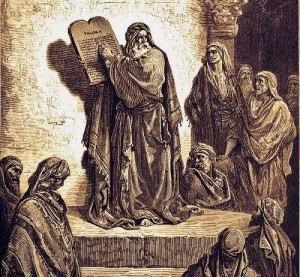Nehemiah 7-8: The Reading of the Torah
Soon after the arrival of Ezra in Judea in the middle of the fifth century B.C.E., the Judeans entered into a pact to observe the laws of the Torah. As part of this covenant renewal ceremony, the Torah was read aloud and explained.
7-73 When the seventh month arrived—Israelites being [settled] in their towns—8-1 the entire people assembled as one man in the square before the Water Gate, and they asked Ezra the scribe to bring the scroll of the Teaching of Moses (Torah) with which the Lord had charged Israel 2 On the first day of the seventh month, Ezra the priest brought the Teaching before the congregation, men and women and all who could listen with understanding. 3 He read from it, facing the square before the Water Gate, from the first light until midday, to the men and the women and those who could understand; the ears of all the people were given to the scroll of the Teaching.
4 Ezra the scribe stood upon a wooden tower made for the purpose, and beside him stood Mattithiah, Shema, Ananiah, Uriah, Hilkiah, and Maaseiah at his right, and at his left Pedaiah, Mishael, Malchijah, Hashum, Hashbaddanah, Zechariah, Meshullam. 54 5 Ezra opened the scroll in the sight of all the people, for he was above all the people; as he opened it, all the people stood up. 6 Ezra blessed the Lord, the great God, and all the people answered, “Amen, Amen,” with hands upraised. Then they bowed their heads and prostrated themselves before the Lord with their faces to the ground. 7 Jeshua, Bani, Sherebiah, Jamin, Akkub, Shabbethai, Hodiah, Maaseiah,
Kelita, Azariah, Jozabad, Hanan, Pelaiah, and the Levites explained the Teaching to the people, while the people stood in their places. 8 They read from the scroll of the Teaching of God, translating it and giving it the sense; so they understood the reading.
54. There is a mixture of Hebrew and Persian names in this list, showing the influence of the Babylonian exile.




